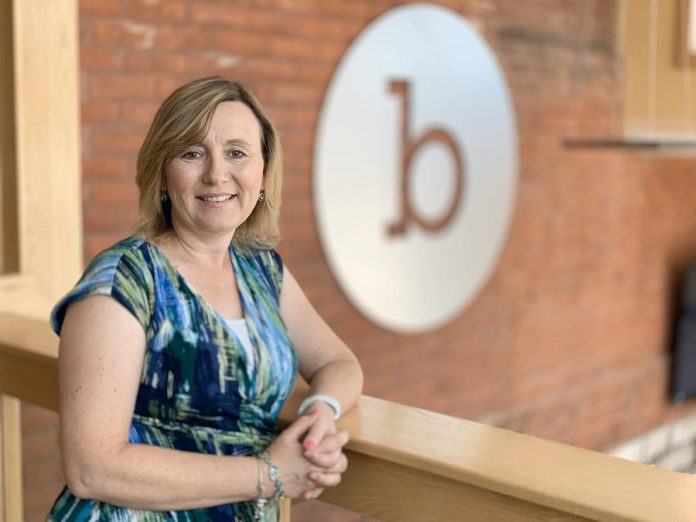
As an educator, April Boyce watched students struggle with Attention Deficit Hyperactivity Disorder (ADHD). As a mom to a child with ADHD, April realized she needed to be the advocate her own family needed — but she didn’t stop there.
April has now taken her learning, experience, and best practice and turned it into specialized coaching services for people impacted by ADHD in the Peterborough area.
From her new Looking Glass Coaching office in the “be well centre” at 459 George Street, April acts as a partner in the quest to harness the positive aspects of ADHD, so those who are impacted will not have to face it alone. She uses specialized coaching to help clients of all ages overcome their unique challenges while harnessing the positive aspects of ADHD.
April says the disorder has been poorly named, and her approach to coaching helps clients develop insight into what their skills are and where their successes have come from in the past.
“When there’s interest, the brain produces dopamine — a chemical necessary to sustain interest and activate executive functions,” April explains. “Those are the abilities we need to focus, concentrate, make decisions, remember things, et cetera. People with ADHD are dopamine deficient and therefore find it much harder to access those all-important executive functions.”
This understanding is part of how April works with her clients when they need help getting “un-stuck”.
ADHD can cause time blindness, making it hard to begin tasks, and it can also cause different manifestations of disorganization. These are things that April works through with her clients, who range in age from youth to newly diagnosed adults.
“ADHDers can get trapped because they can’t start,” April says. “This can be so overwhelming. As a coach, I help them understand what helps them flourish.”
April can also help clients understand how to create better environments for productivity and learning. Movement can help some clients, while harnessing creativity can help others.
Underlying all April does is the belief that the “pill is not the skill.” While many of her clients might be managing their disorder with prescribed medications, the skills she connects them with will open more positive pathways to a productive future.
April’s understanding has evolved through a combination of her background as an educator, her experience advocating for and mentoring her own ADHD child, and also lots of specialized learning.
With this wealth of experience and knowledge, along with over 300 hours of ADHD coach-specific training, April sets to work with her clients to figure out the problems they want to solve.
“We take on one thing at a time,” April says. “We figure out what’s in your way, where you want to be, and how you get there.”
This approach does not follow a typical medical model. Instead, April says she focuses on her clients as whole, nerurodiverse persons.
The whole-person approach is part of why she’s put down concrete roots at the “be well centre” at a time when many coaches are offering services online. She loves the collaborative environment the centre can provide and she’s happy to connect with her clients in person — where they share their diverse energy face to face.
“I always leave coaching sessions feeling fired-up,” she notes. “I help people leave with insights and awareness, with a plan, and with direction.”
Many of the clients April works with benefit from her use of positive psychology and her focus on the positive aspects of the disorder, while making sense of and managing the challenges — like establishing boundaries and setting goals.
“There is no correlation between intellect and ADHD,” she explains. “But many with ADHD are under-stimulated and under-employed. When they come to me, they often are in desperate need to feel like there is hope and that they are not alone.”
“There are also a lot of very successful executives and professionals with ADHD who are killing it at work, but their personal lives are in a shambles because the executive function demands of their jobs take every ounce of energy they have.”
“This is not a one-size-fits-all disorder. I want people to know when they walk into my space, it is a shame-free zone where they can work on whatever is getting in the way.”
April says monumental change happens when her clients learn to leverage what the brain does. That’s when she knows her clients will find success.
“I like coaching because my clients have a plan of action when they leave a session,” she says. “The final outcome is entirely up to them — it’s about what they want to walk away with.”
Being empowered to make plans, to see future goals, to put resources in place, and to anticipate success are welcome changes for those across the region who have been living with the daily stigma and challenges of ADHD.
April is happy to be a resource and to help the ADHD community understand that every journey is unique.
“Where did the belief come from that you have to be like everyone else?” April asks. “Let’s find what works … and do that more.”
Looking Glass Coaching is located in the “be well centre” at 459 George Street North in downtown Peterborough. For more information on Looking Glass Coaching, call 705-702-3880, email april@lookingglasscoaching.ca, or visit lookingglasscoaching.ca. You can also follow Looking Glass Coaching on Facebook and Instagram.




























